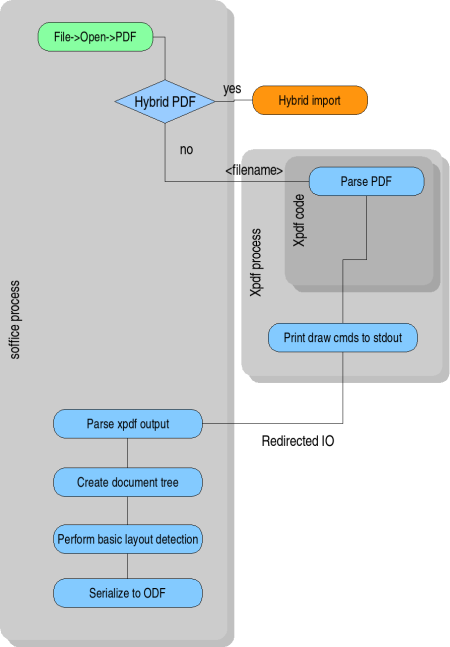Difference between revisions of "Pdf Import Extension/Current Architecture"
From Apache OpenOffice Wiki
| Line 2: | Line 2: | ||
This is a bit cumbersome, as xpdf is GPL licensed, which makes it necessary to run it completely out-of-process for OOo (being LGPL-licensed). A dedicated replacement parser is in the making ([http://framework.openoffice.org/source/browse/framework/filter/source/pdfimport/pdfparse/?only_with_tag=cws_src680_picom filter/source/pdfimport/pdfparse]), will take some time to be on par with xpdf, though. | This is a bit cumbersome, as xpdf is GPL licensed, which makes it necessary to run it completely out-of-process for OOo (being LGPL-licensed). A dedicated replacement parser is in the making ([http://framework.openoffice.org/source/browse/framework/filter/source/pdfimport/pdfparse/?only_with_tag=cws_src680_picom filter/source/pdfimport/pdfparse]), will take some time to be on par with xpdf, though. | ||
| + | |||
| + | Currently, the way PDF files get imported looks like this: | ||
| + | |||
| + | [[Image:Pdf_architecture.png]] | ||
Revision as of 15:36, 12 November 2007
Currently, the PDF import extension utilizes xpdf for parsing the pdf file, and generating a bunch of low-level output operations to synthesize an ODF document.
This is a bit cumbersome, as xpdf is GPL licensed, which makes it necessary to run it completely out-of-process for OOo (being LGPL-licensed). A dedicated replacement parser is in the making (filter/source/pdfimport/pdfparse), will take some time to be on par with xpdf, though.
Currently, the way PDF files get imported looks like this:
